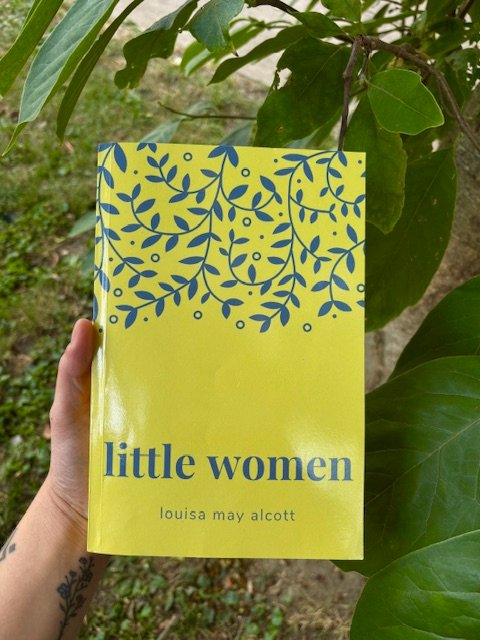Keep It Critical, Keep It Classy

By Delaney Church
The intimidating novel splayed across my lap stared up at me, waiting for me to open it. What was so intimidating about it? It was a standard novel in every aspect. It wasn’t any heftier than a regular novel, nor did it have sharp teeth and an angry sneer. It had a beautiful blue and green cover, an attractive font and a simple design – perfect for drawing any book lover in. There was only one difference between this novel and the countless others I had read: this was a classic.
“Little Women” was the first classic piece of literature that I had set out to read for enjoyment after college. As the unsuspecting book rested on my lap, I recalled why I chose to read this book in the first place, despite the doubtful feelings it stirred within me. As a recent graduate with an English degree, I was no stranger to classic literature. Outside of school, however, I found myself unlikely to pick up a classic book and read it with the same curiosity and joy that I would a Young Adult Fiction novel. Why was that? Perhaps it was the difficult language, the unfamiliar time periods these novels took place in, or even the subject matter itself. Many of my hesitations were derived from what I was required to read in school, but now, I had the freedom to explore classic literature on my own.
As an avid reader, I made the resolution that I would learn to find interest in classic books and give them a fair shot. After all, classic literature is classic for a reason. It has been known to expand any honest reader’s empathy, vocabulary, knowledge, and most importantly, critical thinking skills. It is safe to say that young people of today aren’t as eager to read George Orwell, Jane Austen or Emily Brontë as opposed to more modern authors of the twenty-first century. Perhaps it is for the same reason that I was hesitant to dip my toes into classic literature. However, classic literature is a door waiting to be opened (or should I say, a page waiting to be turned) to uncover complex themes, dynamic characters, and connections to culture, society, and history.
Once I got past staring at the front cover of “Little Women,” my journey of exploring classic literature finally began. While the first few dozen pages were a challenge to get through due to the language and unfamiliar scene-setting, I soon found myself entangled in the lives of the March family. Once I let go of my expectations, I was able to immerse myself in the U.S. Civil War era, almost as if I were one of the March sisters myself. Themes like community, resilience, family and friendship drew me in, and the struggles the March sisters faced were surprisingly relatable, though they were born into a distant generation from my own. Within a month, I had realized something crucial about classic literature: the reading experience may be challenging, but the lessons and takeaways are rewarding.
And so my journey continued. After “Little Women,” I found myself encouraged to read more books. I persisted through passages of advanced vocabulary, did my best to discern references of time periods ago, and eagerly engaged with original narratives in a variety of novels. “Pride and Prejudice” gave me new perspectives on status, class and the value of assessing one’s biases, but also contained themes I knew I would be interested in already, such as romance and sisterhood. “Wuthering Heights” explored intricate storytelling through gothic imagery and character development, while “1984” highlighted the merit of critical thought and rebellion against the status quo.
Now, nearly eight months later, I have read and enjoyed countless classic novels, and no longer stare at their covers in doubt, fear or trepidation. Just because a novel, topic, theme or writing style is unfamiliar or challenging doesn’t mean that you cannot enjoy the valuable experience of reading classic literature. These timeless books transcend the period in which they were written and inspire people to think deeply and critically. The best kind of novels challenge you, and they can still include humor, romance, fantasy, or many of the other qualities that I know I personally enjoy most when reading.
Young people may instinctively shy away from classic novels for a variety of reasons– they may seem ‘too academic’, appear difficult to read, or they may just not know where to start. My biggest tip for those who are interested in dipping their toes into classic literature is to start by watching the movie adaptation of a novel you’re interested in reading. Many of the most popular works of literature have been made into movies, and these can help you familiarize yourself with the characters, narrative and plot, all without the pressure of reading. Secondly, if you find yourself discouraged starting off, I would encourage you to push through and not try to make sense of every minor detail. Get a feel for the bigger picture until you become familiar with the language and dialect– the bigger picture often holds the bigger message. Finally, find affordable books so that cost is not a factor that stands in the way. Personally, I find the best used books on Amazon or at my local Half Price Books store.
Classic literature can be daunting, but never fear! There are endless novels to choose from, all with timeless lessons and takeaways that have the power to cultivate empathy, knowledge, and critical thinking. Grab a classic you think you might be interested in and give it a try. After all, they don’t have teeth and won’t bite!